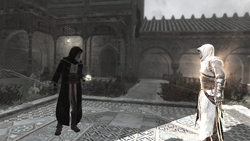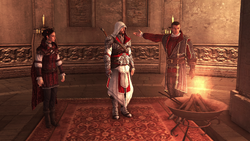
|
Patience, brothers. Soon we will reveal the secrets of Assassin's Creed IV: Black Flag, Assassin's Creed III: Liberation and Assassin's Creed: Initiates. This article has been identified as being out of date. Please update the article to reflect recent releases and then remove this template once done. |

|
We do this together or not at all. It has been proposed that this page be merged with Assassin leader, under the article: Mentor. Discussion to this effect can be held on the former article's talk page. |
| This article is about the highest rank of the Assassin Brotherhood, sometimes referred to as "Grand Master". You may be looking for other uses of the title. |
- "The Mentor's role is to oversee and coordinate the actions of the Order in the pursuit of harmony through free will."
- ―The Mentor, 2000.[src]

The emblem of the Assassin Order
The title of Mentor was an honorific title given to leaders of the Assassin Order who had obtained an extraordinary amount of skill and wisdom, and subsequently used these skills to tutor aspiring apprentices.[1]
The Assassin leaders who were assigned to direct the branches of the Brotherhood spread around the globe were granted the title of Mentor, once they had trained a specific number of apprentices and attained a high amount of skill and wisdom themselves.[1]
In 2000, the title of Mentor had become official and singular, with only a single Mentor leading the entire Assassin Order.[1] Typically, the Mentor acted as a living conduit for all of their predecessors, possessing the sum total of all of their knowledge and experience, which was passed down from Mentor to Mentor.[2] However, following this Mentor's death, the Great Purge was enacted, with the leadership of the Assassin Order under a specified Mentor waylaid in efforts to evade detection by the Templars.
History
Classical Antiquity
During the 1st century in Ptolemaic Egypt, the Medjay, Bayek of Siwa, alongside his ex-wife Aya of Alexandria, founded the Hidden Ones, a precusor to the Assassin Brotherhood. In 38 BCE in Sinai, while laying down the foundations that would become the Creed, Bayek declared to the Hidden Ones that Aya, now known as Amunet, was a Mentor to the brotherhood, thus marking the first time the term "Mentor" was used.[3]
Middle Ages

Al Mualim attempting to sway Altaïr to his cause
The term was later used during the Crusades in the Levant, where the leader of the Levantine Assassins, referred to only as Al Mualim, was most commonly referred to as "Al Mualim," Arabic for "the Mentor." When Al Mualim used his Apple of Eden to brainwash the Assassins in Masyaf and claim absolute control over them, he was confronted and killed by his student Altaïr Ibn-La'Ahad.[4]
Altaïr succeeded Al Mualim as Mentor, and made many reforms and innovations to the Assassin Order.[5] These changes along with his efforts to spread the influences of the Assassins made him the most legendary and respected Mentor of the entire Order.[6]
In 1227, Altaïr's childhood rival Abbas Sofian staged a coup d'état against Altaïr, resulting in the Levantine branch falling under Abbas' leadership and of Altaïr's self-imposed exile.[7] Usurping the title of Mentor,[6] Abbas tyrannically ruled the branch and its headquarters of Masyaf with a disregard for the Creed, until he was killed by Altaïr in 1247,[7] marking the return of Altaïr's rule as Mentor. Altaïr held this title for ten more years, until he disbanded the Levantine Assassins from Masyaf and passed away in his library during the Mongol attack on Masyaf on 12 August 1257.[6]
Renaissance
- "You will now be known as il Mentore, the guardian of our Order and our secrets."
- ―Niccolò Machiavelli to Ezio Auditore.[src]

Ezio Auditore being promoted to Mentor
In August 1503, Ezio Auditore da Firenze was promoted to the rank of Mentor of the Italian Assassins by the de facto leader Niccolò Machiavelli, for his years of exploits against the Borgia family.[8] He held this position for several years, and also acted as a leader and teacher to the Ottoman Assassins during his time in Constantinople.[6]
Ezio resigned as Mentor upon returning to Italy from the Ottoman Empire in 1513, and assigned Lodovico Ariosto to become his successor.[9] As of 1511, a descendant of Altaïr Ibn-La'Ahad, Iskender, held the position of Mentor of the Egyptian Assassins. Around this time, Iskender received aid from Ezio Auditore da Firenze after having been arrested and imprisoned.[6]
Some time after Ezio's retirement from the Assassin Order, the Chinese Assassin Shao Jun and her Mentor attempted to flee from China, to escape from Emperor Jiajing's purge of the country – which included Assassins – and request Ezio's aid. However, once the two of them had arrived in Venice, Jiajing's Imperial soldiers caught up with the Assassins, and Jun's Mentor died while trying to secure her safety and escape. She eventually avenged her Mentor and later took on the role of Mentor herself.[10]
Colonial America

Achilles and Connor in Boston
During the later 18th century, most of the Assassins in Colonial America had been wiped out, leaving the survivor Achilles Davenport as the Mentor of the Colonial Brotherhood. During the time before the American Revolutionary War, he was hesitant with training new Assassins, due to his agreement with the Templars concerning his life. Eventually though, he trained the native Ratonhnhaké:ton as a member of the order, leading him until his death.[11]
Under Achilles' reign, the Brotherhood regrew in the area, and the fight led by Ratonhnhaké:ton greatly diminished the influence of the Templar Order in the colonies. He led from his home in the manor atop the Davenport Homestead, which overlooked the naval power that Achilles had created for the Brotherhood. Following Achilles' death, Ratonhnhaké:ton assassinated the remaining Templar conspirators, presumably becoming the de facto Mentor.[11]
France
During the Middle Ages, the Mentor of the French Brotherhood was Guillaume de Nogaret, who most notably influenced King Philip IV of France into declaring the Templar Order illegal and assigned Master Assassin Thomas de Carneillon to lead the assault on the Templar headquarters. The raid was successful, with the Knights Templar disbanded and their Grand Master Jacques de Molay executed. Carneillon himself took the title of Mentor sometime after de Molay's execution.
Many years later, during the French Revolution, the title was held by Honoré Gabriel Riqueti, comte de Mirabeau, a noted and venerated public speaker and one of the most famous contributors to the Revolution. His reign as Mentor saw two ultimately unsuccessful attempts to secure peace between the French Brotherhood and the Templars, the second of which resulted in Mirabeau's fatal poisoning by Pierre Bellec, who opposed any such truce. Though leadership of the Brotherhood fell to Master Assassin Sophie Trenet, it would appear she did not take the title of Mentor as she was never addressed as such.
Indian Broterhood
During the mid-19th century, the Mentor of the Indian Brotherhood of Assassins was Hamid. Under the leadership of Hamid, the Assassins were a strong presence in the Sikh Empire. Hamid instructed Assassin Arbaaz Mir to find a Piece of Eden known as the Koh-i-Noor. Located in the palace of Maharaja Ranjit Singh, the Piece of Eden was said to hold an immense amount of power and was sought heavily by the Assassins as well as the Templars.
Modern time

Daniel Cross killing the Mentor
During the 20th century, the entire Assassin Order was united under a single Mentor.[1] By 1998, an individual known only as "the Mentor" led the Order, though his name and location were always kept secret – even from the Assassins themselves – for safety concerns, and he always stayed mobile to avoid being located. In November 2000, the Mentor invited Daniel Cross into his secret Dubai headquarters after having monitored his actions for two years, believing him to be a worthy apprentice.[2]
However, Daniel, whose brain had been unknowingly experimented upon by Abstergo Industries and imprinted with an impulse to kill the Mentor, subsequently assassinated him after having been rewarded with a Hidden Blade. Following this, the Assassins were thrown into disarray and forced underground,[2] and the mantle of leader was eventually picked up by William Miles.[6]
Known Mentors
References
- ↑ 1.0 1.1 1.2 1.3 Assassin's Creed Encyclopedia
- ↑ 2.0 2.1 2.2 2.3 Assassin's Creed: The Fall – Issue #3
- ↑ Assassin's Creed: Origins
- ↑ Assassin's Creed
- ↑ Assassin's Creed II
- ↑ 6.00 6.01 6.02 6.03 6.04 6.05 6.06 6.07 6.08 6.09 6.10 Assassin's Creed: Revelations
- ↑ 7.0 7.1 Assassin's Creed: The Secret Crusade
- ↑ 8.0 8.1 Assassin's Creed: Brotherhood
- ↑ 9.0 9.1 Assassin's Creed: Revelations novel
- ↑ Assassin's Creed: Embers
- ↑ 11.0 11.1 11.2 Assassin's Creed III
- ↑ 12.0 12.1 The Hidden Ones (DLC)
- ↑ Assassin's Creed: Last Descendants – Fate of the Gods
- ↑ 14.0 14.1 "Assassin's Creed: Memories Cite error: Invalid
<ref>tag; name "ACM" defined multiple times with different content - ↑ Assassin's Creed: Last Descendants - Tomb of the Khan
- ↑ 16.0 16.1 16.2 16.3 16.4 Assassin's Creed: Unity
- ↑ Assassin's Creed: Heresy
- ↑ Assassin's Creed: Rebellion
- ↑ Assassin's Creed
- ↑ Assassin's Creed: Rebellion
- ↑ 21.0 21.1 21.2 Assassin's Creed Chronicles: China
- ↑ 22.0 22.1 22.2 Assassin's Creed: Initiates – Surveillance
- ↑ Assassin's Creed IV: Black Flag
- ↑ Assassin's Creed: The Official Movie Novelization
- ↑ 25.0 25.1 Assassin's Creed III: Liberation
- ↑ Assassin's Creed: Brahman
- ↑ Assassin's Creed: Last Descendants
- ↑ Assassin's Creed: The Fall
- ↑ Assassin's Creed: Syndicate – Database: Galina Voronina
- ↑ Assassin's Creed: Syndicate - Database: Shaun Hastings

![Hidden One Bayek.png (2.74 MB) Bayek[12] Egyptian Brotherhood (c. 47 BCE – ?)](https://static.wikia.nocookie.net/assassinscreed/images/c/c1/Hidden_One_Bayek.png/revision/latest/scale-to-width-down/122?cb=20240405122718)
![ACO Aya render.png (469 KB) Aya[12] Roman Brotherhood (c. 47 BCE – ?)](https://static.wikia.nocookie.net/assassinscreed/images/c/cf/ACO_Aya_render.png/revision/latest/scale-to-width-down/104?cb=20171027012840)
![Wiki noimage.jpg (30 KB) Torgny[13] Viking Brotherhood (c. 984)](https://static.wikia.nocookie.net/assassinscreed/images/6/69/Wiki_noimage.jpg/revision/latest/scale-to-width-down/180?cb=20140622155635)
![ACR Altair Render2.png (1.29 MB) Altaïr Ibn-La'Ahad[6] Levantine Brotherhood (1191 – 1227; 1247 – 1257)](https://static.wikia.nocookie.net/assassinscreed/images/9/93/ACR_Altair_Render2.png/revision/latest/scale-to-width-down/75?cb=20130502201908)
![AC Malik render.png (3.65 MB) Malik Al-Sayf[6] Levantine Brotherhood (1217 – 1228)](https://static.wikia.nocookie.net/assassinscreed/images/c/c6/AC_Malik_render.png/revision/latest/scale-to-width-down/60?cb=20140331174121)
![Abbas Sofian render.png (54 KB) Abbas Sofian[6] Levantine Brotherhood (1227 – 1247)](https://static.wikia.nocookie.net/assassinscreed/images/8/80/Abbas_Sofian_render.png/revision/latest/scale-to-width-down/93?cb=20130102142047)
![ACU De Carneillon Render.png (364 KB) Thomas de Carneillon[16] French Brotherhood (c. 1307 – ?)](https://static.wikia.nocookie.net/assassinscreed/images/5/5f/ACU_De_Carneillon_Render.png/revision/latest/scale-to-width-down/64?cb=20150120161254)
![ACM Benedicto 3.jpg (44 KB) Benedicto[19] Spanish Brotherhood (? – 1492)](https://static.wikia.nocookie.net/assassinscreed/images/0/0a/ACM_Benedicto_3.jpg/revision/latest/scale-to-width-down/133?cb=20170430182611)
![AC Aguilar Cropped.jpg (2.54 MB) Aguilar de Nerha[20] Spanish Brotherhood (?)](https://static.wikia.nocookie.net/assassinscreed/images/5/50/AC_Aguilar_Cropped.jpg/revision/latest/scale-to-width-down/123?cb=20160512051259)
![ACB Machiavelli render.png (3.75 MB) Niccolò Machiavelli[14] Italian Brotherhood (c. 1503)](https://static.wikia.nocookie.net/assassinscreed/images/8/8d/ACB_Machiavelli_render.png/revision/latest/scale-to-width-down/102?cb=20130408100644)
![ACI-Ezio.png (264 KB) Ezio Auditore da Firenze[8] Italian Brotherhood (1503 – 1513)](https://static.wikia.nocookie.net/assassinscreed/images/6/66/ACI-Ezio.png/revision/latest/scale-to-width-down/87?cb=20131014134656)
![ACCC Wang Yangming.png (441 KB) Wang Yangming[21] Chinese Brotherhood (? – 1524; c. 1526 – 1529)](https://static.wikia.nocookie.net/assassinscreed/images/7/7e/ACCC_Wang_Yangming.png/revision/latest/scale-to-width-down/114?cb=20150415051314)
![ACCC Zhu Jiuyuan.jpg (41 KB) Zhu Jiuyuan[21] Chinese Brotherhood (1524)](https://static.wikia.nocookie.net/assassinscreed/images/3/39/ACCC_Zhu_Jiuyuan.jpg/revision/latest/scale-to-width-down/180?cb=20150426130415)
![ACCC-Shao Jun Render.png (896 KB) Shao Jun[21] Chinese Brotherhood (c. 1532 – ?)](https://static.wikia.nocookie.net/assassinscreed/images/0/0e/ACCC-Shao_Jun_Render.png/revision/latest/scale-to-width-down/103?cb=20150407215640)
![AC4 Ah Tabai render.png (494 KB) Ah Tabai[23] West Indies Brotherhood (1713 – c. 1745)](https://static.wikia.nocookie.net/assassinscreed/images/c/c5/AC4_Ah_Tabai_render.png/revision/latest/scale-to-width-down/68?cb=20140916204815)
![ACRG Achilles render.png (1.66 MB) Achilles Davenport[11] Colonial Brotherhood (1746 – 1763)](https://static.wikia.nocookie.net/assassinscreed/images/6/6b/ACRG_Achilles_render.png/revision/latest/scale-to-width-down/69?cb=20141129043048)
![AgateDatabaseHD.png (350 KB) Agaté[25] Louisiana Brotherhood (1759 – 1777)](https://static.wikia.nocookie.net/assassinscreed/images/f/f6/AgateDatabaseHD.png/revision/latest/scale-to-width-down/90?cb=20140118171834)
![ACU Mirabeau Render.png (403 KB) Honoré Gabriel Riqueti, comte de Mirabeau[16] Parisian Brotherhood (? – 1791)](https://static.wikia.nocookie.net/assassinscreed/images/5/5c/ACU_Mirabeau_Render.png/revision/latest/scale-to-width-down/71?cb=20150120161037)
![ACCI Hamid.png (982 KB) Hamid[26] Indian Brotherhood (c. 1839 – ?)](https://static.wikia.nocookie.net/assassinscreed/images/5/5b/ACCI_Hamid.png/revision/latest/scale-to-width-down/81?cb=20160115132745)
![MentorTheFall.png (347 KB) The Mentor[2] Worldwide (? – 2000)](https://static.wikia.nocookie.net/assassinscreed/images/3/36/MentorTheFall.png/revision/latest/scale-to-width-down/90?cb=20111231183555)
![GOG TheOsakaBrotherhood M.jpg (345 KB) Saeko Mochizuki[22] Japanese Brotherhood (2013 – present)](https://static.wikia.nocookie.net/assassinscreed/images/8/8c/GOG_TheOsakaBrotherhood_M.jpg/revision/latest/scale-to-width-down/155?cb=20131218024717)
![ACi-Matricide.jpg (267 KB) Medeya Voronina[29] Russian Brotherhood (? – 2014)](https://static.wikia.nocookie.net/assassinscreed/images/2/2d/ACi-Matricide.jpg/revision/latest/scale-to-width-down/180?cb=20141218142202)
![AC3 William Miles.png (4.63 MB) William Miles[30] Worldwide (c. 2015 – present)](https://static.wikia.nocookie.net/assassinscreed/images/4/45/AC3_William_Miles.png/revision/latest/scale-to-width-down/64?cb=20140311201937)

